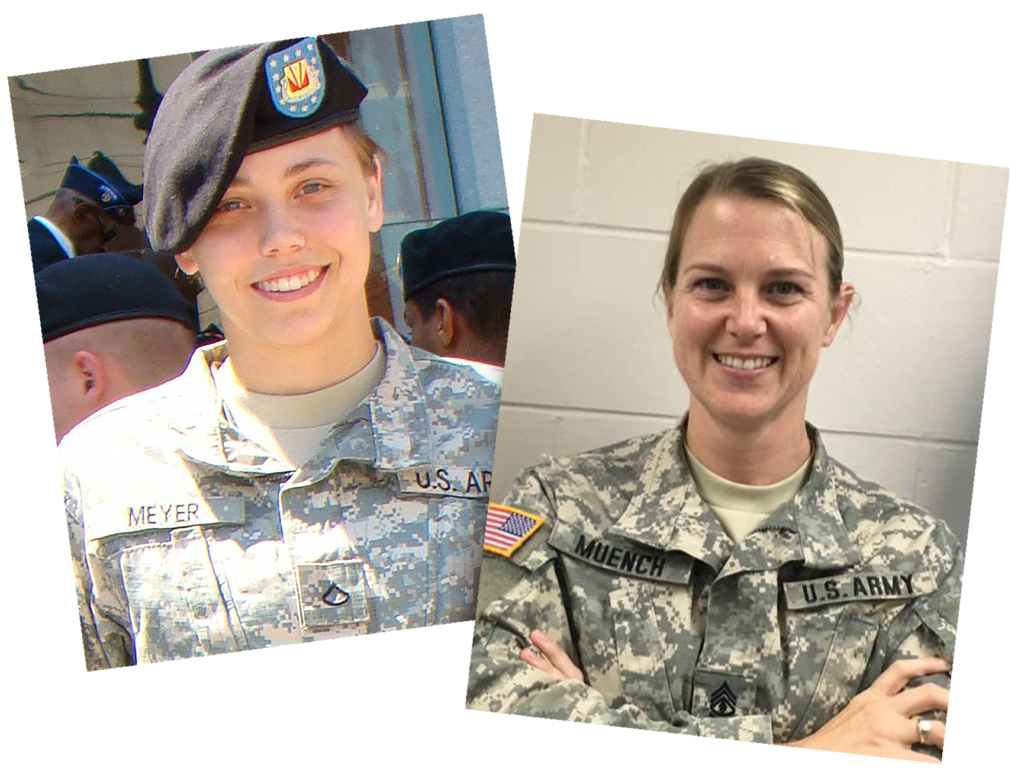
“Because she saw my potential, I was able to show her what kind of soldier I really was.”
Ashe Brasch didn’t want to be interviewed or photographed for this story. But her best friend, Shannan Muench, told her that she had to.
This dynamic isn’t new to them: the often-outgoing Shannan encouraging the sometimes-reserved Ashe into areas where Ashe is less comfortable. Their friendship started during their time in the US Army, when Ashe reported to Shannan, her first sergeant. Now, they both work at Microsoft.
Today, Ashe is visiting Shannan in Seattle to kick off Pride at Microsoft headquarters. It’s been six months since the friends were together in person, and they confess to me that they’ve stayed up all night, laughing and catching up.
While Ashe nervously fidgets with her button-down shirt, Shannan whispers to her, “I’m probably going to cry. Don’t let me cry.” Ashe laughs and nods; she’ll protect Shannan.
In something like twin-speak that’s part sarcasm and part dry humor, they tell me the story of their unlikely friendship.
*****
“Oh man, do we have to start with the phone call?” Shannan interrupts Ashe as she begins answering my first question. “She’s held that over my head for so long.”
Ashe smirks and proceeds.
Back in 2016, both were living in Florida, and Shannan was putting together a new unit of incoming noncommissioned officers. Ashe’s name was on that list. Since it’s common practice to get to know and take care of the service member’s family, Shannan asked Ashe about her personal life.
“Are you married? And what does your husband do?” Shannan asked Ashe over the phone.
“I don’t know why I did that,” Shannan interjects in real time. “I never say that! I always say ‘spouse’ or ‘partner.’ Ugh.”
Ashe looks at her sideways, deadpan, “Can I finish?”
“Anyway,” Ashe continues, “‘I just told her, ‘Well, my wife . . . blah, blah, blah.’”
Mortified, Shannan apologized profusely on the phone (and is still apologizing, though it’s obvious that Ashe still likes to tease her about it).
Ashe learned a lot about Shannan from that one mistake. It was already rare to have a female first sergeant, but this one admitted to being wrong.
“She owned up to her mistake. I never forgot that,”
She owned up to her mistake. I never forgot that.
*****
Owning up to who she really was took a while for Shannan.
When she first began her career in the Army, she felt like she had to be loud, direct, and authoritarian. But Shannan doesn’t naturally have a dominating personality and keeping up the façade was making her miserable. She slowly learned to embrace the strengths found in her softer, more-empathetic side.
“That’s when I became more of a compassionate leader,” Shannan says. She got to know her soldiers on a personal level, talked through their problems, and helped them where she could.
“Don’t get me wrong—I can yell, be directive, make people jump. I can get stuff done.”
“Mm-hmm,” Ashe nods affirmatively, eyes wide. “Yes ma’am, she can.”

It’s one reason that Ashe really likes Shannan.
“She didn’t care what the guys said,” Ashe says. “It was nice actually seeing a female in front of all these men, letting everyone know what’s up.”
Shannan laughs. “When one of us succeeds, it helps the other one so much more.”
*****
Just before joining Shannan’s unit, Ashe’s life took a turn for the worse. A divorce and nearly five hours a day commuting to the army base in Tampa had her logistically locked down. At the same time, Shannan was heavily recruiting Ashe to her unit. As Ashe became increasingly stuck, Shannan grew ever more determined to help Ashe (short for Ashley, a name that no one except Shannan and Ashe’s mom get to use).
“Ashley,” starts Shannan, “I mean Ashe! Ashe was trying to make decisions that would better her life, but everything was kind of falling apart. So I kept asking her, ‘Okay, how can we make things work?’”
When Ashe’s power was shut off and a new roommate took off without paying rent, she hit rock bottom.

And that’s when Shannan called. Or emailed.
“Every week she would send me an email,” says Ashe. “And if I didn’t respond, she’d send another asking, ‘Did you get my email? I have these three things you need to do.’”
That’s how the friendship grew, the two constantly sharing ideas and options back and forth.
Finally, after three months, Ashe was able to transfer.
“When I moved, I was in a bad way. I was so depressed and felt really alone. I didn’t have anyone in Florida, especially after my wife and I separated. I slowly came to realize that I had a friend—even though she was my first sergeant, she was also my friend.
“Shannan became my person.”
*****
In 2018, Shannan took a job at Microsoft, a fact that still makes Ashe laugh.
“If Shannan has a superpower, it’s breaking technology,” she says, rolling her eyes, reminiscing about when she used to fix Shannan’s printer back in the Army. Shannan agrees. But she found a way in through a nontraditional computer science program that provides an alternative approach to finding and training tech talent.
Once Shannan was settled in her new role as a program manager working on Office 365, she got to work recruiting Ashe again, teaching her about the culture and coaching her in resume writing.
“I won’t even lie—Shannan is the only reason I have a LinkedIn profile,” Ashe admits, wryly.
In 2019, Ashe started her first day as a premier field engineer, which supports customers with Office 365 questions.
“I told you she was pushy,” Ashe teases.
“It’s because I saw potential,” Shannan jabs back, literally. With her elbow.
“Ouch,” Ashe laughs as she rubs her side. “That’s true, though. Because she saw my potential, I was able to show her the kind of soldier I really was.”
*****
“We joke about how we hate people,” Shannan tells me on the sunny balcony of her condo building. “But we love people. We love to help; that’s why we both were in the military.”
“I do, that’s true. I like helping, but man, I still hate people,” Ashe says. Shannan rolls her eyes at her friend’s fake seriousness.
 Just one month into her job at Microsoft, Ashe actively looked to get involved with the company’s LGBTQI+ community. That’s how she came to organize the company’s presence in the Chicago Pride parade and is helping get a GLEAM (Microsoft’s employee-led LGBTQI+ group) chapter off the ground there.
Just one month into her job at Microsoft, Ashe actively looked to get involved with the company’s LGBTQI+ community. That’s how she came to organize the company’s presence in the Chicago Pride parade and is helping get a GLEAM (Microsoft’s employee-led LGBTQI+ group) chapter off the ground there.
Shannan volunteers as the communications lead for another employee-led group called Military at Microsoft, which supports and creates a sense of belonging for current and former military members and their families who now work at Microsoft.
This calling to help and to be a part of a team is what drew them both to Microsoft, too.
“My manager now at Microsoft—you’d think I’d have known him my entire life,” Ashe says. “He literally said to me, ‘You don’t work for me. I work for you. You tell me what you need and how to make your job easy.’ And I was like, ‘Where am I? Like where am I?’” she laughs.
*****

We pack up our stuff and head to a park to grab a few photographs outside of the two doing what they usually do together—laughing hysterically and generally enjoying each other’s company. Shannan lingers back to talk to me as Ashe cracks a joke with the photographer.
“Honestly, I didn’t know if Ashe was going to make it,” Shannan says, choosing her words slowly now and dabbing her eyes. “I was really worried. She was just so depressed.”
“Are you crying?” Ashe yells from up ahead where she’s scouted a good location overlooking Seattle. “Dude, stop bawling—you said you’d kill me if I let you cry.”
Shannan laughs and wipes her eyes.
“I’m not!” she hollers back.
We catch up with Ashe, and I ask her if the interview was torture.
“Absolutely,” she smirks, tossing her tattooed arm across Shannan’s shoulder. “Hated every minute.”
*****
Photography by Roderigo De Medeiros; Videography by Roderigo De Medeiros and Micah Knapp.
Shannan left Microsoft in 2020.

